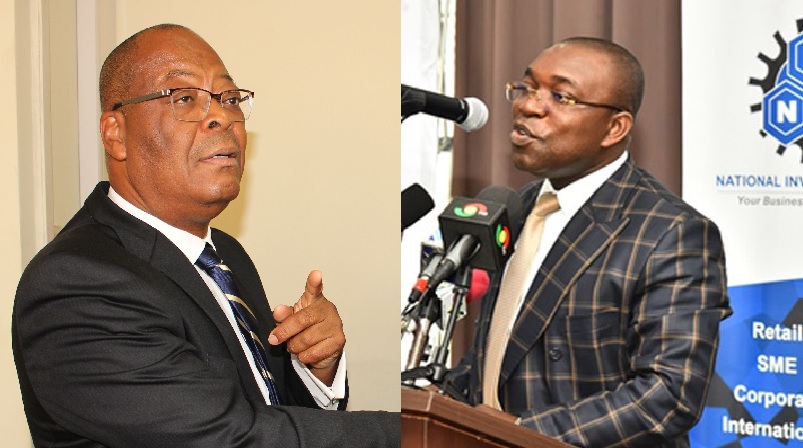
GCB plans to takeover NIB
GCB Bank Limited has begun overtures to takeover state-owned lender, the National Investment Bank (NIB), in what could create the biggest bank in the country in asset terms.
A successful consummation of the deal could potentially create an enlarged GCB Bank with an asset size in excess of GH¢10 billion. This automatically means a much healthier balance sheet to fund big ticket transactions.
The combined business could also have on its payroll over 2,000 employees and about 250 branches and agency offices nationwide.
A source told the GRAPHIC BUSINESS that preliminary discussions on a possible takeover had begun at the boards level between the two banks and are expected to prepare the grounds for a deal later in the year.
It said the discussions were at the behest of the two banks’ common shareholder – the government – and meant to ensure that GCB was “well narrowing prepared to swallow NIB.”
“As we speak, GCB Bank is seriously considering a deal with NIB. I will even call it a takeover and there are indications that it can happen anytime soon,” the source said.
Unlike the NIB, which is 100 per cent state-owned, the government and other quasi state institutions, including the Social Security and National Insurance Trust (SSNIT), the Ghana Reinsurance Company and Ghana Cocoa Board (COCOBOD) hold a majority stake of 52.5 per cent in the GCB Bank.
This makes a takeover of NIB by GCB easier because the deal will only require the blessing of SSNIT – the bank’s biggest shareholder with a 29.89 per cent stake – and the Ministry of Finance (MoF), which manages the government’s 21.36 per cent stake.
Another source disclosed that the most recent meeting on the matter occurred on July 5.
“It is actually because of the potential takeover that a substantive Managing Director for NIB has not been appointed. The idea is to merge NIB with GCB Bank so that NIB can become a department in charge of project financing, among others,” the source added.
Since August, last year, when Mr Ernest Marlie Agbesi resigned from NIB to manage GCB Bank (he later resigned in June, this year), Mr John Kweku Asamoah has been the MD of NIB.
Ease of transaction
With assets in excess of GH¢6 billion, equity of GH¢1.1 billion and cash and cash equivalents of GH¢1.2 billion (as of December, 2016), GCB Bank seems well prepared to acquire NIB, which has been suffering from under investment over the years.
After sectorial challenges combined with deficiency in management to pressure the bank to deviate from its core mandate of development financing, NIB has since become a pale shadow of its glorious past, when it was the go-to bank by startups.
The bank is credited with the birth of over 100 renowned enterprises, including the defunct regional development corporations, today’s Nestle Ghana Limited, Novotel Hotel (now Accra City Hotel) and Aluworks.
Although its agricultural and trading departments later evolved into today’s Universal Merchant Bank and Agricultural Development Bank, limited investments means that NIB’s own future continues to be gloomy, hence GCB’s overtures.
Also, with NIB yet to meet regulatory requirements on capital yet another round of recapitalisation of possibly GH¢300 million is looming, the first source said the government was “almost convinced” that a takeover of the bank by the GCB Bank will help spare the government the headache of recapitalising two banks concurrently.
“Besides, whatever capital Bank of Ghana will set, there is no way NIB will be able to meet it. So, they (NIB) will have to be swallowed by a big one like GCB,” the source added.
Outcome of merger
A successful consummation of NIB by GCB Bank will represent a strategic move to help build a strong bank that can finance big ticket transactions and expand into neighbouring countries
For a start, it will help raise GCB’s assets to some GH¢10 billion, enough to play a critical role in the country’s growth aspirations.
In that regard, the new bank will be well positioned to rival counterpart banks in neighbouring Nigeria, where similar mergers led to bigger banks accumulating excess capital and that prompted them to expand into the sub-region.
Apart from the GN Bank and UT Bank that operate in Liberia and Nigeria respectively, none of the 13 indigenous banks has operations outside the country.
Grounds for mergers
The GRAPHIC BUSINESS understands the GCB Bank and NIB deal is one of a possible few.
It is hoped that ongoing negotiations will result in bank consolidations in line with earlier aspirations by some policymakers and analysts.
With a population of about 27 million people and annual gross domestic product (GDP) of close to $40 billion, Ghana’s economy is understandably small for the current 35 banks.
The situation even becomes more interesting when Ghana is weighed against Nigeria and South Africa, whose economies are estimated to be worth US$550 billion and US$400 billion respectively.
Unlike in Ghana, 25 and 20 banks serve some 56 million and 190 million people in Nigeria and South Africa respectively, making Ghana’s bank numbers a curious spectacle to analysts.